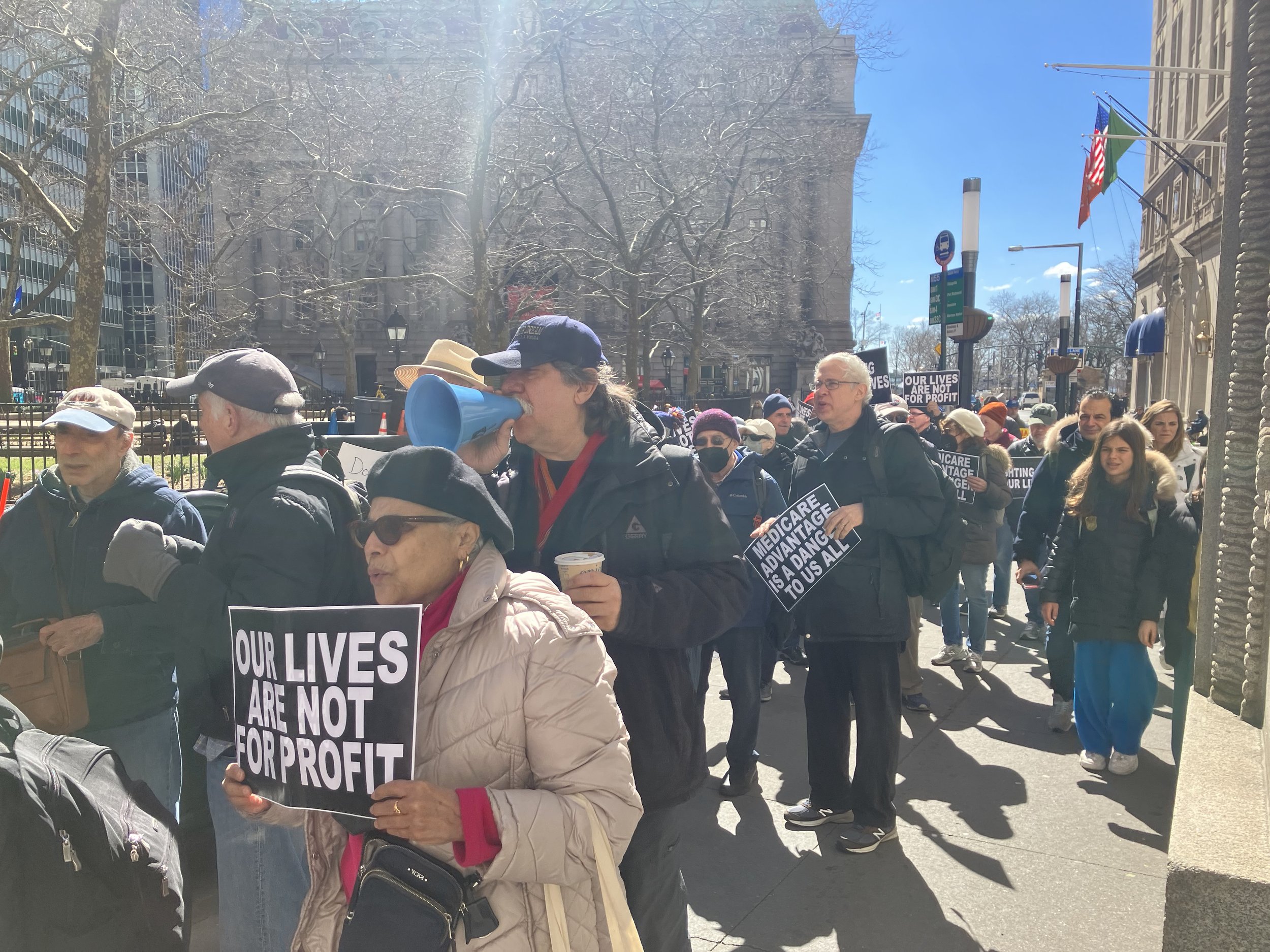Not 1 Voice in Favor of Medicare Advantage During Nearly 4-Hour Public Hearing…
“Our Lives Are Not Profit.” NYC Mayor Eric Adams and the heads of the MLC continue their campaign to strip municipal retirees of the traditional Medicare benefits. Photo by Joe Maniscalco
By Bob Hennelly
Dozens of outraged New York City retired civil servants dialed into a teleconferenced public hearing convened by the city’s Office of Labor Relations on March 21, a legal perquisite to advance the controversial $200 million Aetna Medicare Advantage contract being promoted by the Adams administration and the Municipal Labor Committee [MLC].
Not one witness offered support for the Aetna plan during the nearly four-hour public hearing. However, some hearing participants expressed surprise that they had discovered an “Option C” in the Aetna contract that would permit retirees to keep their conventional Medicare without any additional out-of-pocket cost to the retiree, but require the city pay Aetna a $20 fee for every retiree who did so.
“If Adams authorized that fee arrangement, the $600 million in annual budget savings that his administration projects from the Advantage plan would all but certainly shrink, though it’s unclear by how much,” reported the Daily News.
The mayor has since indicated that “Option C” isn’t an option.
Under the terms of the pending deal, Aetna’s contract would start on Sept. 1 and run through the end of 2028 with the option of three two-year renewals.
Neil Frumkin, representing DC 37 ‘s Retiree Association, said he and his fellow retirees were concerned the city’s drive to the for-profit Aetna Medicare Advantage was shifting the cost of retiree healthcare to the federal government and that the move “would put additional stress on the Medicare Fund which we think may fail due to this onerous burden in the future.”
“We also see this plan as something that shifts costs from the city to the retirees—how so? It incorporates co-pays which we did not have initially in our health benefits, and this puts an undue burden especially on our Black, Latino and women retirees, the majority of whom are in the low-income category and are members of the DC 37 Retiree Association,” Frumkin said. “We see this as unconscionable.”
Stu Eber, chair of the Council of Municipal Retirees and president emeritus of the Managerial Employees Association, took Office of Labor Relations [OLR] to task for rushing the procurement process and asked for the public hearing to be delayed.
“You can’t expect 240,000 people to absorb all this detailed contract information in less than two weeks,” Eber said. “We need the time to understand the options and consequences of our choices. The city needs to rethink its rush to privatization and that you continue to provide Medicare-based coverage we were promised.”
Marianne Pizzitola, a retired FDNY EMT and president of the New York City Organization of Public Service Retirees, testified that “New York City should not be assisting and encouraging the privatization of public health and Medicare.”
“The city should not be relying on federal funding that can be fluid and that can change or put at-risk retirees having to absorb more costs if that funding ever changes as it has changed in the past, and forced cost changes and plan changes on the city’s Hip/VIP Plan in 2017. The same thing will happen with this,” Pizzitola warned.
Sue Ellen Dodell is a New York City retiree who served as the deputy general counsel to three different New York City Comptrollers and is an expert on city procurement practices and procedures.
Dodell testified that Aetna’s recent drop in its annual CMS Star rating raised several serious questions. “When an Advantage Plan’s rating falls, it results in a reduction in payments from the federal government. How will this reduction in star rating affect this contract? Will it result in higher payments by the city and/or higher premiums for retirees? Will the contract be amended to account for this change?”
The former deputy general counsel suggested that New York City Comptroller Brad Lander would be hard pressed to certify that Aetna was a “responsible entity with which the City should do business,” as required by law.
“Not only has Aetna admitted to a history of insuring slave-holders against the injury and death of enslaved persons, but more recently, Aetna has a long history of lawsuits against it for fraud and denying care related to members of its Medicare Advantage plans,” Dodell said. “Numerous lawsuits have alleged that Aetna has denied needed care, resulting in serious injury and death. Why would the City want to contract with a company with such a history?”
A few retirees offered their first-hand accounts of being denied access to critical care thanks to Aetna’s pre-authorization process, something that the boosters of the city’s negotiated plan say would be significantly curtailed.
Several witnesses referenced reports in the New York Times that “eight of the 10 biggest Medicare Advantage insurers — representing more than two-thirds of the market — have submitted inflated bills, according to the federal audits. And four of the five largest players — UnitedHealth, Humana, Elevance and Kaiser — have faced federal lawsuits alleging that efforts to over diagnose their customers crossed the line into fraud.”
“The fifth company, CVS Health, which owns Aetna, told investors its practices were being investigated by the Department of Justice,” the Times reported.

